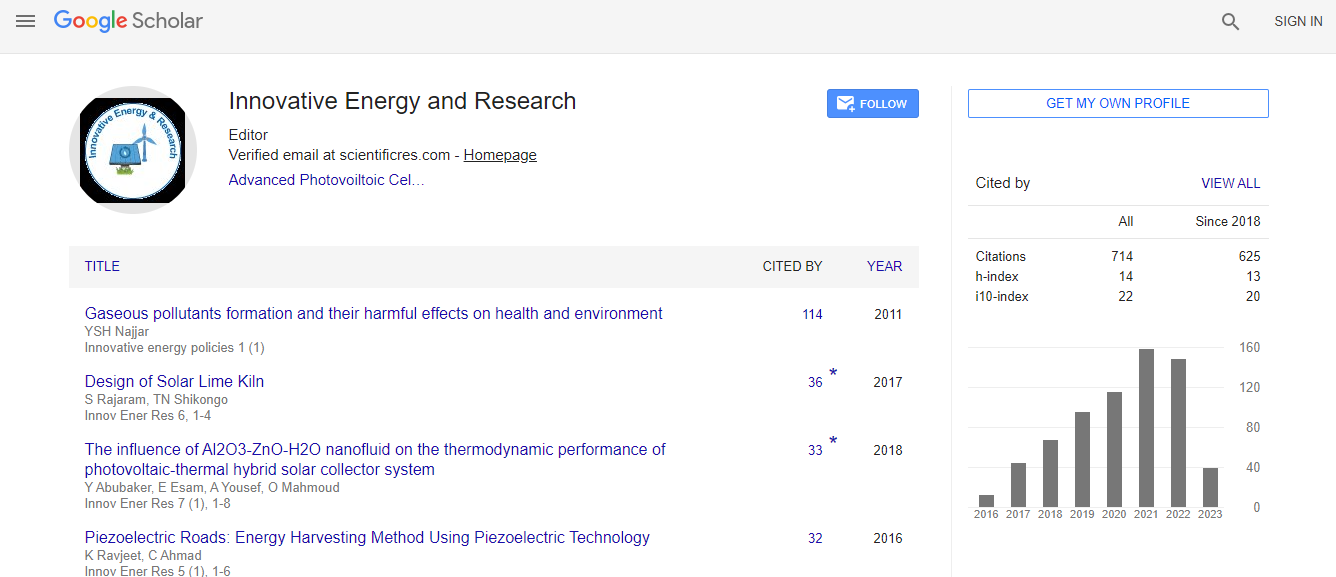Our Group organises 3000+ Global Conferenceseries Events every year across USA, Europe & Asia with support from 1000 more scientific Societies and Publishes 700+ Open Access Journals which contains over 50000 eminent personalities, reputed scientists as editorial board members.
Open Access Journals gaining more Readers and Citations
700 Journals and 15,000,000 Readers Each Journal is getting 25,000+ Readers
Google Scholar citation report
Citations : 712
Innovative Energy & Research received 712 citations as per Google Scholar report
Innovative Energy & Research peer review process verified at publons
Indexed In
- Google Scholar
- Open J Gate
- Genamics JournalSeek
- RefSeek
- Hamdard University
- EBSCO A-Z
- Publons
- Euro Pub
- ICMJE
Useful Links
Recommended Journals
Related Subjects
Share This Page
Viscosity modeling and flow properties of non-edible oils as feed-stock in biodiesel production
Joint Event on 2nd International Conference on Renewable Energy and Resources & Energy Materials and Fuel Cell Research
Kenneth Okafor, Musa Danjaji and Martin Figura
South Carolina State University, USA
ScientificTracks Abstracts: Innov Ener Res
Abstract
In a previous study, non-edible plant seeds were sought as sources of vegetable oils as alternatives to soybean oil which is the major source of oil feedstock for the manufacturing of biodiesel in the United States of America. Soybean oil as a resource also doubles as a staple food: it is the most widely consumed cooking oil (frying, baking and a condiment in salads). Commercially, soybean oil is also used in printing ink and oil paint formulations. Hence the motivation for the search for other oil sources especially for the non-edible/non-staple sources. In this study, several plant seeds which were selected based on their ease of cultivation and short maturation periods were investigated for the yields, densities and the degrees of saturation and compared to the soybean output as a benchmark. A further investigation is undertaken in the present study to compare the viscosities and the Cloud Point (CP) temperatures of the benchmark soybean oil and the non-edible oils that compared favorably to the soybean oil in terms of the yields and Iodine Values (IV). Different mathematical models were applied in the fitting of the measured viscosity data. However, since the models did not adequately represent the data in the region of interest (lower temperatures), a new mathematical model was developed which in combination with measured data were used to infer the Cloud Point temperatures of the oil samples. The inferred Cloud Point temperatures ranged from -17oC for the Lavender oil to 8oC for the Morning Glory oil. For the benchmark oil (Soybean), the Cloud Point temperature was inferred to be 0oC. Therefore, most of the sample oils had Cloud Point temperatures lower than for the benchmark which confirms these oil candidates as possible replacements of the benchmark.Biography
Okafor graduated from the Ohio State University with a Ph.D in Nuclear Engineering in 1988. He is currently a professor of Nuclear Engineering at the South Carolina State University where he teaches courses in nuclear sciences and engineering. His areas of interest include Reactor Physics, Nuclear Criticality Safety and Renewable Energy. Prior to coming to South Carolina State University he worked at the Savannah River Laboratory (SRL) in Aiken, SC under Dupont and Westinghouse companies (facility operators) involved in research and development in reactor analysis and technical support in the handling and storage of nuclear materials.
E-mail: kokafor@scsu.edu

 Spanish
Spanish  Chinese
Chinese  Russian
Russian  German
German  French
French  Japanese
Japanese  Portuguese
Portuguese  Hindi
Hindi 
